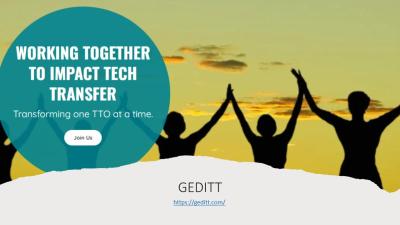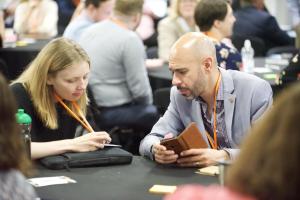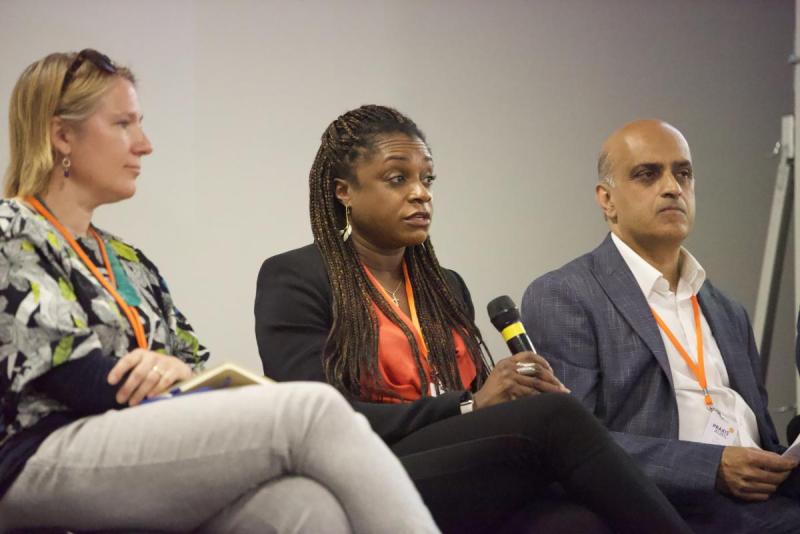Guest blog by Tas Gohir (he/him), Senior IP and Commercial Research Manager, Guy’s and St Thomas’ NHS Foundation Trust 
This blog considers the business critical role of Inclusion, Diversity, Equality and Accessibility (IDEA) for TTOs. IDEA is no longer an optional activity.
"Diversity is being asked to the party, Inclusion is being asked to dance" Verna Myers, VP at Netflix
No one can deny that Inclusion, Diversity, Equality, Accessibility (IDEA) is a hot topic right now. Indeed, recognising its importance, #PrAConf22 hosted a stream solely dedicated to IDEA and I was fortunate enough to participate as a panellist on the discussion 'Accelerating Equality, Diversity and Inclusion within KE: how we can tr ansform how we work for more inclusive and innovative outcomes'. The Conference also saw the introduction to GEDITT (Global Equality, Diversity and Inclusion in Tech Transfer), which has its origins in the USA and UK and is developing linkages around the world. The entity was created in early 2021 by colleagues in the UK: Tom Hockaday, Anji Miller and Natalie Cozier and colleagues in the US: Lisa Mueller, Almesha Campbell, and Megan Aanstoos; individuals with extensive experience of knowledge exchange (KE) work and who are highly passionate about making a positive impact for the benefit of tech transfer and KE overall. GEDITT is focused on all types of KE activity across Higher Education Institutions and whilst it is not possible to go into the full specifics of everything that was covered during the GEDITT Panel Discussion here, I am turning the spotlight on the theme of the importance and relevance of IDEA for Technology Transfer Offices (TTOs). Other aspects of the Panel Discussion will be highlighted in other articles and events in due course, so please do keep an eye out for those notices from PraxisAuril.
ansform how we work for more inclusive and innovative outcomes'. The Conference also saw the introduction to GEDITT (Global Equality, Diversity and Inclusion in Tech Transfer), which has its origins in the USA and UK and is developing linkages around the world. The entity was created in early 2021 by colleagues in the UK: Tom Hockaday, Anji Miller and Natalie Cozier and colleagues in the US: Lisa Mueller, Almesha Campbell, and Megan Aanstoos; individuals with extensive experience of knowledge exchange (KE) work and who are highly passionate about making a positive impact for the benefit of tech transfer and KE overall. GEDITT is focused on all types of KE activity across Higher Education Institutions and whilst it is not possible to go into the full specifics of everything that was covered during the GEDITT Panel Discussion here, I am turning the spotlight on the theme of the importance and relevance of IDEA for Technology Transfer Offices (TTOs). Other aspects of the Panel Discussion will be highlighted in other articles and events in due course, so please do keep an eye out for those notices from PraxisAuril.
First and foremost, IDEA is, without question, important in its own right and requires no further justification. IDEA is the right thing to do in any sphere of life and I do not consider it to be an optional, nice-to-do activity. It has business critical significance. Furthermore, with the current state of global politics, where there is much division, IDEA is one area where we can come together to create positivity and further improve the status of the KE profession. In addition to IDEA being morally correct, I believe it enables considerable business and operational advantages to TTOs. These advantages are no different from those offered to other types of organisations and are worth emphasising here.
There is a body of research which concludes, quite clearly, that companies which implement sound IDEA policies are more competitive and profitable than those which do not (Hewlett, S et al, 2013). This is not surprising  as diverse teams are more likely to draw upon a much wider range of talent, perspectives and ways of thinking in order to formulate innovative solutions. There are lessons to be learned here by TTOs. More proactively, including IDEA in your operations may be beneficial in achieving your goals and objectives. These will not necessarily be motivated by profit, as in the case of commercial organisations, but directed more towards licensing deals, spinout creation, generating impact and achieving other forms of KE. Whatever your goals and objectives, which can differ substantially between TTOs, there is a better chance of achieving them with a diverse team. This point is particularly significant considering the generally recognised skills shortage in university KE. In the face of such a skills gap, it is essential for TTOs to recruit from a wide a base of candidates as possible. This is absolutely imperative considering the complex nature of the work of TTOs and the need for highly skilled staff to drive innovation activity. I would suggest that leveraging the benefits of IDEA is an important strategy for TTOs.
as diverse teams are more likely to draw upon a much wider range of talent, perspectives and ways of thinking in order to formulate innovative solutions. There are lessons to be learned here by TTOs. More proactively, including IDEA in your operations may be beneficial in achieving your goals and objectives. These will not necessarily be motivated by profit, as in the case of commercial organisations, but directed more towards licensing deals, spinout creation, generating impact and achieving other forms of KE. Whatever your goals and objectives, which can differ substantially between TTOs, there is a better chance of achieving them with a diverse team. This point is particularly significant considering the generally recognised skills shortage in university KE. In the face of such a skills gap, it is essential for TTOs to recruit from a wide a base of candidates as possible. This is absolutely imperative considering the complex nature of the work of TTOs and the need for highly skilled staff to drive innovation activity. I would suggest that leveraging the benefits of IDEA is an important strategy for TTOs.
Furthermore, due to the nature of KE, TTOs are in a pivotal position to influence IDEA activity across a wide range of partners, including licensees, spinouts and other strategic collaborators.
No doubt, many great innovations of the past had their conceptual roots, creation and development in diverse multidisciplinary teams. Any number of such invention s could be cited as examples. One that is pertinent to our times, and was discussed during the IDEA Panel Discussion, was the development of the mRNA Covid-19 vaccines, brought to market at lightning speed and against the odds. The diversity of individuals across the relevant organisations concerned, both in terms of ethnicity and gender, is striking. It was one of the reasons which led Gregory Zuckerman, an award winning Wall Street journalist, to write his book ‘A Shot to Save the World’ about the race to develop the Covid-19 vaccines (Zuckerman, 2021). During a CNN interview earlier this year, he specifically stated that the diversity of the key players in this drama attracted his attention and was an important reason for writing the book. Until the time of the Covid-19 pandemic, development of mRNA-based vaccines was generally considered by the mainstream scientific community to be near impossible with one obstacle being the high instability of mRNA. Yet the combined efforts of a diverse group with differing backgrounds and talents, overcame one of the most difficult biomedical feats of our time. I am not saying that it is purely the diversity of the individuals that led to the success, but I find it an interesting case to consider.
s could be cited as examples. One that is pertinent to our times, and was discussed during the IDEA Panel Discussion, was the development of the mRNA Covid-19 vaccines, brought to market at lightning speed and against the odds. The diversity of individuals across the relevant organisations concerned, both in terms of ethnicity and gender, is striking. It was one of the reasons which led Gregory Zuckerman, an award winning Wall Street journalist, to write his book ‘A Shot to Save the World’ about the race to develop the Covid-19 vaccines (Zuckerman, 2021). During a CNN interview earlier this year, he specifically stated that the diversity of the key players in this drama attracted his attention and was an important reason for writing the book. Until the time of the Covid-19 pandemic, development of mRNA-based vaccines was generally considered by the mainstream scientific community to be near impossible with one obstacle being the high instability of mRNA. Yet the combined efforts of a diverse group with differing backgrounds and talents, overcame one of the most difficult biomedical feats of our time. I am not saying that it is purely the diversity of the individuals that led to the success, but I find it an interesting case to consider.
Additionally, highlighted during the Panel Discussion was The Hamilton Commission Report “Accelerating Change: Improving Representation of Black People in UK Motorsport”. This was undertaken in association with The Royal Academy of Engineering and authored by Dr Rhys Morgan and Yohanes Scarlett. Both professional motorsport and technology transfer are elite activities. I define ‘elite’ here as activities undertaken by a small group of people, having the capability to influence many others. It may be helpful to give greater consideration to the Report to ascertain if, and what, lessons can be learned by the KE community:
Overall, feedback from those who attended the IDEA Panel Discussion was very positive and encouraging. There was a particular interest in setting up a PraxisAuril IDEA Special Interest Group. All feedback was very helpful and an update on progress will be given shortly.
For more information on GEDITT:
Website: www.geditt.com
LinkedIn Group: https://www.linkedin.com/groups/12556040
Slack channel: gedittworkspace.slack.com
You are welcome to contribute.
References
- Hewlett, S; Marshall, M and Sherbin, L. “How Diversity Can Drive Innovation”, Harvard Business Review, December 2013.
- Zuckerman, G. “A Shot to Save the World: The Remarkable Race and Ground-Breaking Science Behind the Covid-19 vaccines”. Penguin Business, October 2021.